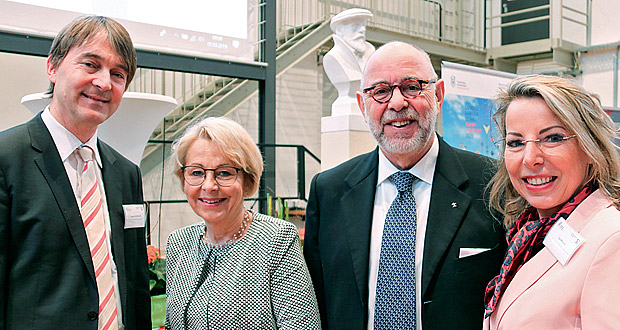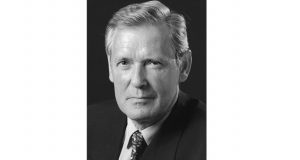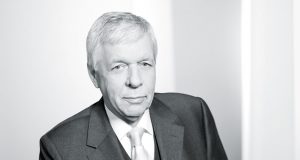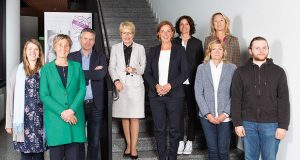Kamp-Lintfort/Germany, at the edge of the Ruhr valley area: In a place once dominated by noise, dirt, sweat and coal, there is to be a horticultural show in 2020, with millions of visitors descending on the former mining site of Friedrich-Heinrich mine. How to transform former working sites into local recreation areas was one of the focal points of “NACHBergbauzeit in NRW” (Post-mining era in North Rhine-Westphalia). The District Government of Arnsberg as the mining authority for North Rhine-Westphalia and the TH Georg Agricola University (THGA) in Bochum/Germany held the joint specialist conference for the fifth time on 7th March 2019 (Figure 1). Some 300 experts who gathered in Bochum focused this time on the challenges and prospects – and above all, the opportunities – of the post-mining era. As a symbol of this, the former Friedrich-Heinrich mine was featured on this year’s programme flyer.
The event was opened by Bärbel Bergerhoff-Wodopia, Member of the Board of Executives at the RAG-Stiftung, Essen. She took an optimistic view of the future following the end of coal mining in Germany: “The Ruhr was once an important region for mining expertise, now it is a centre of knowledge for the post-mining era. We all want the former mining sites to move forward in their economic development and secure new places of work.” This is one of the reasons why the RAG-Stiftung is supporting the THGA in the scientific training and development of post-mining experts and the research of so-called “perpetual obligations”.
These perpetual obligations include mine water management, polder measures and groundwater management. “These are issues that are more relevant than ever before and that we will be dealing with for many decades to come,” says Mining Assessor Friedrich Wilhelm Wagner, Head of the Department of Mining and Energy in North Rhine-Westphalia in the District Government of Arnsberg. He explains that the fact that the current federal state government has incorporated these aspects in its coalition agreements demonstrates the important role that post-mining issues will play in the future. Even the mining authority itself is planning to expand its risk management activities, according to Wagner, “from the area of abandoned shafts to near-surface mining with its drift systems and water-carrying tunnels.” Others will also benefit from the expertise. Similar problems are also being encountered in many other regions of Germany, particularly in the former coal and ore districts of Bavaria, Lower Saxony, Saxony and Thuringia.
However, even though a lot of research and engineering work is already being carried out, the post-mining era is only just beginning, says University President Prof. Jürgen Kretschmann. “A lot more knowledge needs to be developed and shared. Events like “NACHBergbauzeit in NRW” will help us to do that.” Stakeholders from the science community, business, local communities and authorities engaged in interdisciplinary dialogue over the course of eleven specialist presentations and many lively discussions. “Like mining, post-mining involves everyone,” says Kretschmann. He believes that the significant interest shown by all sides at this early stage demonstrates that post-mining will be an extremely important issue in the future: “If we maintain and build on the current progress being made in the Ruhr, this will enable us to take on a leading international role in post-mining.” The THGA is making good headway in this regard. Since 2015, the university has been investigating the urgent issues that will need to be addressed when mining stops at a unique post-mining research centre. The THGA offers a master’s course in geological engineering and post-mining that teaches young people how to plan and implement the complex processes involved in closing power stations and the follow-up work required – in some cases, in perpetuity. (THGA/Si.)



